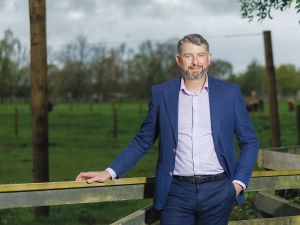2024/25 Dairy Statistics: NZ dairy farmers boost production with fewer cows
According to the New Zealand Dairy Statistics 2024/25 report, New Zealand dairy farmers are achieving more with fewer cows.
 LIC's new general manager operations and service Mark Julian says increasing the quality of New Zealand's dairy herd is vital to future success.
LIC's new general manager operations and service Mark Julian says increasing the quality of New Zealand's dairy herd is vital to future success.
LIC's new general manager operations and service Mark Julian wants to continue helping farmers breed better cows and boost productivity.
Julian, who took up his new role recently, says increasing the quality of New Zealand's dairy herd is vital to future success.
With New Zealand said to have passed 'peak cow', breeding better cows has been doing a lot of heavy lifting to boost productivity.
Julian points out that farm productivity tracks close to 1.5% annually and the majority of this is directly attributed to genetic gain in animals.
Average per cow production jumped from 307 kgMS in 2001 to 397 kgMS end of 2021 season.
Julian says the 25% jump in production is a testament to herds breeding better cows with improved efficiency and this ultimately drives improved profitability on farm.
He says LIC offers premium bull teams for farmers to breed high genetic merit cows which produce more milk, more efficiently - resulting in a lower environmental footprint per kilogram of milk solid produced.
Julian says the production efficiency of every cow in the national dairy herd has never been more important.
"Farmers are investing in solutions to breed the best cows, faster.
"These breeding decisions will serve them well into the future to build a more profitable and sustainable dairy sector and meet climate goals."
Julian's team, made up of 1,850 people, is responsible for the co-op's farms and the delivery of essential herd improvement services to farmers, including artificial breeding, herd testing, genetic diagnostics and animal health tests.
LIC'S peak operational period runs from 1 September through to Christmas, where its AB technicians inseminate up to 100,000 cows a day, around 400,000 herd test milk samples are processed each week and up to 30,000 animal samples are tested for DNA and animal health on a weekly basis.
Julian says LIC is an innovative company with significant investment in research and development, with a lot of potential for growth.
"New Zealand pastoral farming is underpinned by productivity improvements.
"The services and support LIC provides its dairy farming shareholders to help them breed better cows and improve their farming operation really interests me."
"With the peak spring period upon us, I've hit the ground running and am looking forward to gaining a deeper understanding of how the co-op works and supporting my team to deliver operational excellence to farmer shareholders during this important time on-farm."
Julian grew up on a dairy farm in Taranaki and has been involved in the dairy sector throughout his career, most recently as general manager dairy operations at Pāmu, the state-owned enterprise with a nationwide portfolio of farms.
He worked for Pāmu for 14 years and managed 300 staff.
LIC chief executive David Chin, who was GM operations & service prior to taking up his current role in January, says Julian is a highly regarded leader in the dairy sector who has a wealth of knowledge when it comes to running a sustainable, profitable farming business.
"I'm confident Mark's passion for farming, combined with his ability to implement strategies that deliver positive outcomes will serve our farmer shareholders well."
A New Zealand-first native tree study has highlighted the Bioeconomy Science Institute's position as a forestry research leader.
Hemp fibre processor Rubisco is relocating its core processing facility to Ashburton as part of a $20-$30 million expansion to leverage what it says is an accelerating global demand for sustainable and renewable fibres.
Tradition meets some of the latest in technology at the 2026 East Coast Farming Expo.
OPINION: Trade Minister Todd McClay and the trade negotiator in government have presented Kiwis with an amazing gift for 2026 - a long awaited and critical free trade deal with India.
Former Agriculture Minister Nathan Guy says he's excited about his new role as NZ's Special Agricultural Trade Envoy.
A pillar of New Zealand's horticultural industry, Dr Stuart Davis, was farewelled at a well-attended funeral service in Tuakau, South Auckland, on December 18.
President Donald Trump’s decision to impose tariffs on imports into the US is doing good things for global trade, according…
Seen a giant cheese roll rolling along Southland’s roads?